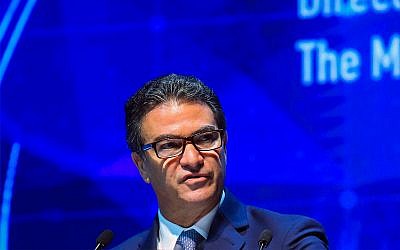
Ahead of Kushner visit, North African nation quashes speculation it could be next to improve ties with Jerusalem, says move would ’embolden’ Israel’s ‘mistreatment’ of Palestinians.
Moroccan Prime Minister Saad-Eddine El Othmani denied on Sunday that the North African nation will soon normalize ties with Israel, amid speculation that Rabat could be the next Arab country to sign a deal with Jerusalem.
“We refuse any normalization with the Zionist entity because this emboldens it to go further in breaching the rights of the Palestinian people,” El Otmani told his Islamist PJD party, according to the Reuters news agency.
The remarks came before an expected trip to Israel, Morocco and several Gulf states next week by US President Donald Trump’s senior adviser and son-in-law Jared Kushner. He will be preceded in the region by US Secretary of State Mike Pompeo.
Pompeo is set to visit Israel, Sudan, Bahrain and the United Arab Emirates this week as the Trump administration seeks to capitalize on momentum from the historic agreement between Israel and the UAE to establish diplomatic relations.
Last week, Hebrew media reported that Morocco was likely to be one of the next Arab states to normalize diplomatic ties with Israel.

Quoting unnamed US officials, the Kan public broadcaster said Morocco was seen as a likely candidate as it already has tourism and trade ties with Israel. The report also cited the North African country’s protection of its small Jewish community.
Establishing formal diplomatic ties with Israel could also improve Morocco’s relations with the US. The report said that in exchange for doing so, Rabat was seeking American recognition of its sovereignty over the disputed Western Sahara territory.
Morocco occupied large swathes of the Western Sahara in 1975 as Spain withdrew from the area and later annexed the territories in a move not recognized internationally.
Morocco is considered an ally of the United States, and has long maintained informal but close intelligence ties with Israel.
Though the countries have no formal relations, Morocco has hosted Israeli leaders, and Israelis are allowed to visit there. Some 3,000 Jews live in Morocco, a fraction of the number from before the 1948 creation of Israel, but still the largest community in the Arab world.

Besides Morocco, Bahrain, Oman and Sudan have also been touted as nations that could follow the UAE in establishing relations with Israel. Both Bahrain and Oman praised the announcement that Jerusalem and Abu Dhabi would normalize ties.
Pompeo will discuss ties between Israel and Sudan when he meets with Sudanese leaders during his trip to the Middle East this week, the State Department said Sunday.
“In Sudan, the secretary will meet with Prime Minister Abdalla Hamdok and Sovereign Council Chair General Abdel Fattah al-Burhan to discuss continued US support for the civilian-led transitional government, and express support for deepening the Sudan-Israel relationship,” a State Department statement said.
Pompeo’s visit to Khartoum will come amid increasing signs that Sudan and Israel are moving to improve ties.

University on June 24, 2019. (Flash90)
Over the weekend, an Arabic report said that Mossad chief Yossi Cohen met recently with Mohammed Hamdan Dagalo, the deputy head of Sudan’s ruling military council, in a meeting organized and hosted by the UAE. Sources with knowledge of the Cohen-Dagalo meeting told the Qatari news outlet Al-Araby Al-Jadeed that Sudan’s military council is interested in improving ties with Israel.
Also last week, Sudan’s foreign ministry spokesman, Haidar Badawi Sadiq, told Sky News Arabia that Khartoum “aspires towards a peace agreement with Israel… a relationship of equals built upon Khartoum’s interests.”
Those remarks last Tuesday were quickly welcomed by Jerusalem. But hours later Sudan’s acting foreign minister denied knowledge of peace talks with Israel, and said Sadiq had not been authorized to comment on the issue. The spokesman was fired for the comments on Wednesday, but said afterward that he did not regret making them.
From Israel, Pompeo will fly to Sudan and from there to Bahrain for a meeting with Crown Prince of Bahrain Salman bin Hamad Al Khalifa. He will then travel to Abu Dhabi for talks with Emirati Foreign Minister Abdullah bin Zayed Al Nahyan on the Israel-UAE agreement and other regional issues, according to the State Department.
Pompeo will be followed to many of the same destinations later in the week by Kushner, diplomats said.
Kushner and his team are expected to visit Israel, Bahrain, Oman, Saudi Arabia and Morocco on their trip, which is scheduled to begin at the end of the week, according to the diplomats, who spoke on condition of anonymity, because the itinerary has not yet been finalized or publicly announced.
Neither Pompeo’s nor Kushner’s trips are expected to result in announcements of immediate breakthroughs, but both are aimed at building on the success of the Israel-UAE agreement by finalizing at least one, and potentially more, normalization deals between Arab countries and Israel in the near future.
Israel and the United Arab Emirates announced their agreement Thursday afternoon. They “agreed to the full normalization of relations between Israel and the UAE,” they said in a joint statement with the US that was released by US President Donald Trump.
The UAE-Israel deal marks the third such agreement the Jewish state has struck with an Arab country after Egypt (1979) and Jordan (1994).
(Times of Israel).